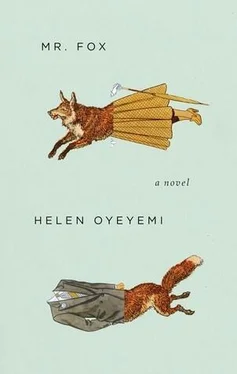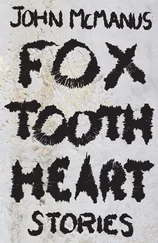The stares from the other passengers grew fixed, and I realised that my lips were moving, so I stopped moving them. Someone asked me if I was all right. Yes, I think so, thank you. Someone else asked me if I was all right. Yes, I think so, thank you. She seemed fine. Maybe she wasn’t well but didn’t want to say so. .
I shouldn’t have drunk so much of that cough syrup. A quarter of a bottle would have been sufficient. Half at the most.
The people around me kept asking if I was all right. Their voices were very kind, filled with concern, as if it was I who needed their concern. I couldn’t see exactly who was talking to me — it all seemed to be coming from every direction at once. My nose ran. Tears fell; they stung, like hail. Sorry, I said. Sorry. Eventually someone came and took me away, and I scooped up all my things and Yelena’s and followed behind the air hostess, dropping books and bottles and passports. Leave them, leave them, Miss Foxe, the air hostess said. I’ll bring your things along for you in a minute. I had a moment of bewilderment— Who is Miss Foxe? — then I just let everything go and went to first class, which is where they wanted me to sit so that I could tremble out of sight of my former cabin mates, so that I wouldn’t distress them, so that I wouldn’t complain later about how I’d been treated after the incident. Yelena was six seats away from me. There was an empty row in front of her and an empty row behind her. They’d arranged her in the seat as if she was sleeping — her face was still covered, but it looked better now that she was upright; it looked as if covering her face was something she did just to help her sleep. Her hands were folded on her lap. I know it sounds strange, but I calmed down a bit once I could see her. She looked lonely, but I didn’t want to join her. The air hostess put Yelena’s handbag beside her and brought me some gin. I huddled up under a blanket, dipped my thumb into the glass and sucked it. Yes, it was like that. .
I closed my eyes and tried to do some stupid breathing exercises.
“Only two hours until landing,” a man’s voice said. It seemed he had addressed the words to me, so I opened my eyes. He was sitting to my right, his whole body turned toward me, his chin on his fist as he studied me. I hadn’t heard or felt him draw near. He was older than me, but I couldn’t guess how much older. He was good-looking. Enough to make me feel uncomfortable. Tall and dark, etc. There was room between his eyes for a third eye of the same size — I’ve read that that’s one of the standards of classic beauty. He was wearing a black suit, but it looked as if he’d slept in it for a week straight — wrinkles within wrinkles. “I’m glad to hear it,” I replied.
“That woman over there is dead,” he remarked.
“I know. I–I was sat next to her.”
“What happened?”
“I think she had some sort of massive heart attack.”
He said, “I see,” and spent a second or two thinking about it. “Did you know her?”
“No.”
“Your eyes are just like a cat’s,” he told me. His voice was husky. There was gravel in it, and waves. I blushed. It was the way he looked into my eyes, unfalteringly into my eyes, as he spoke to me and heard my replies. As close and as direct as the look exchanged when standing face-to-face after a kiss, or at the peak of a bad fight. Worse than that, actually. Closer than that.
He lifted a lock of hair away from my face. “Why is this part white?”
“I was struck by lightning when I was little.” A lie I tell everyone. It made him smile. I liked that he didn’t believe me. I liked that he didn’t question the story but let it stand. We talked a bit more. His name was St. John Fox. (St. John. . I thought that had died out as a first name centuries ago. Posh. He was definitely posh.) We made a halfhearted fuss about having almost identical surnames, wondered about being distant cousins. He’d just presented a paper at a psychiatry conference in Manhattan. I made a joke about him being Dr. Fox and he said, seriously, that he preferred “Mr.” I asked him what the subject of his paper was, but he said it wasn’t particularly interesting. Which meant he thought I was stupid. I wished I hadn’t told him that I model. To make up for it I told him about my psychology degree, and he said, “I’ve got one of those, too.” We talked until the plane landed, and then I broke off and stood up when the economy-class passengers started filing through the cabin, whispering and staring. I didn’t want them to see me lounging around in first, chatting with a handsome doctor. I waited around to see what would be done about Yelena — the airplane staff told me they had to get everyone off the plane first. St. John waited with me, though I hadn’t asked him to. I spoke to the doctor and a representative from the airline; I answered their questions and told them all I could think of. We waited until they asked us to leave. That made me think they were going to do something bad. Stick Yelena on a trolley with some luggage, something like that. There was no wheelchair waiting. This worried me.
St. John stepped off the plane. I didn’t follow. He stopped and looked behind him with an expression of mild surprise. “It’ll be all right, Mary. Let them sort this out. She’s gone. We should go, too.”
We talked all the way through passport control and baggage reclaim. He wasn’t wearing a wedding ring, but that didn’t mean anything either way. I have married friends who don’t wear rings. My parents were married and didn’t wear rings. I finally got him to tell me about his paper. He was interested in fugue states. A fugue state is the result of an afflicted consciousness, he said. A person in a fugue state is somewhere between waking and dreaming, with the mere appearance of functioning normally. An already fragile man might suffer strain from some extraordinary life event at nine o’clock one night, then wake up at seven o’clock the next morning and just walk away from his home, his family, his life. He might take a bus or a long train ride, or a flight, and once he is elsewhere he becomes someone else. He’ll take a new name and forget his old one. His handwriting might change; the way he speaks and behaves changes subtly but significantly. He has no memory of his old life — until, abruptly, the fugue wears off, and what’s left is a frightened, exhausted human being, miles and miles from home and unable to recall what he’s seen and said and done since the evening of his dreadful shock.
“You said it wasn’t an interesting subject.”
“Most of these cases are historical. It’s been argued that fugue states are a nineteenth-century malaise, convenient for central European men looking for work in other countries, a disguise for individual attempts at economic migration, that sort of thing.”
“But you don’t think so.”
“No.” His eyes were very bright; they’d been like that since he’d begun talking about his subject. He looked like someone in love. Well, in love the way people were in old movies.
“Are you working with fugue-state patients right now?”
“If I was, I wouldn’t be allowed to discuss it.” He wheeled my suitcase up to the taxi rank. He only had a light-looking hold-all himself. “My car’s parked down there. I’d offer you a lift, but. .”
“But?”
“But you shouldn’t drive off with strange men you only just met on the plane.”
“Of course.”
(I would have gone with him.)
“It was nice to meet you, St. John. Thanks—” I had no idea what I was thanking him for. He was gazing at me again, with that overwhelming concentration. I seemed to interest him very much — as an artefact, almost.
He drew a business card from his wallet, a pen from the top pocket of his jacket, and rested the card on top of my hard case. “Look — you’ve had a bit of a shock today. And I have some concerns,” he said, writing a phone number on the back. “It’s because your eyes are like a cat’s, you know, and you were struck by lightning. If you don’t phone I’ll assume the worst.”
Читать дальше












